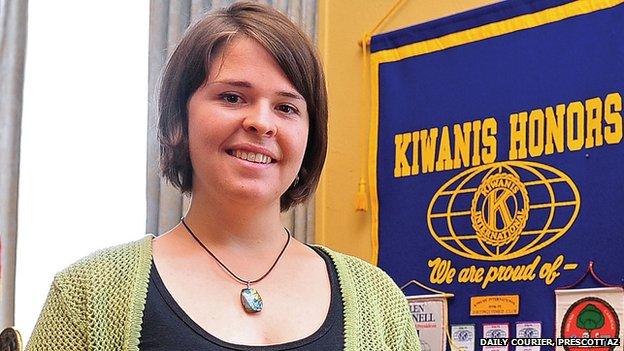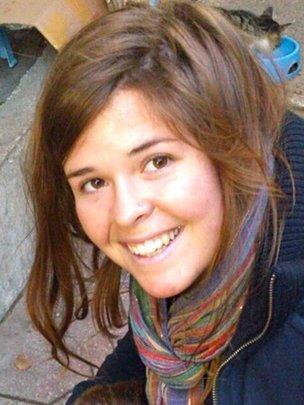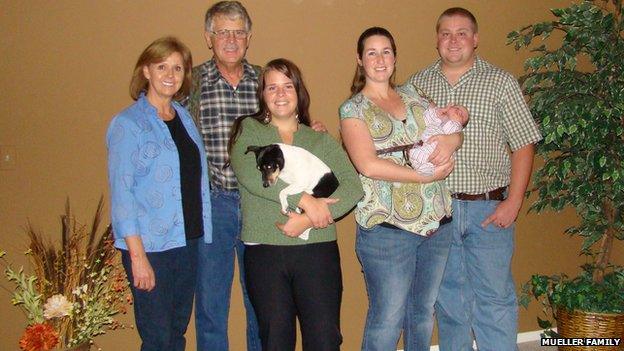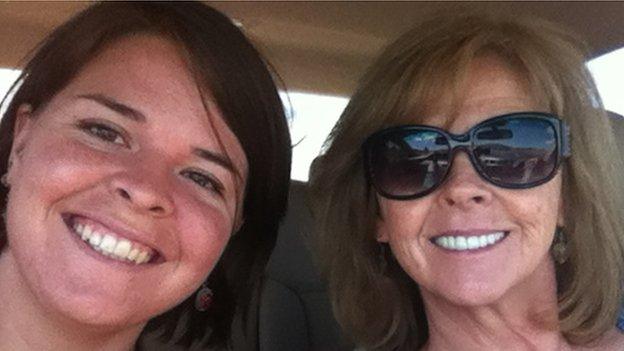Kayla Mueller: US aid worker 'dedicated' to Syrian refugees
- Published

The portrait that has emerged of 26-year-old Kayla Mueller, the Islamic State hostage whose death has been confirmed by the US, external, is of a young woman devoted to helping others.
Ms Mueller travelled to the Turkey-Syria border in 2012, to work for the Danish Refugee Council and Support to Life, according to her family.
On 4 August, 2013 she was taken captive by IS in Aleppo, Syria, while leaving a hospital run by MSF (Doctors without Borders).
During her aid work, Ms Mueller visited refugee camps where she played and painted with Syrian children.
She found that she "can't do enough" to help Syrian families, according to a report in her local Arizona newspaper, The Daily Courier, external.
"When Syrians hear I'm an American, they ask, 'Where is the world?' All I can do is cry with them, because I don't know," she told the newspaper.
Ms Mueller said she heard stories of children being hurt by unexploded bombs, women being forced into early marriages, and children being forced to fight for both sides.
"Syrians are dying by the thousands, and they're fighting just to talk about the rights we have," Mueller told the newspaper.

"For as long as I live, I will not let this suffering be normal. (I will not let this be) something we just accept," she said.
Ms Mueller studied at Northern Arizona University, in Flagstaff, where she volunteered for three years with the Save Darfur Coalition.
She wrote letters and placed calls to members of Congress, and took part in silent protests, according to a separate profile in the Daily Courier, external.
A website set up in her memory, external said she enjoyed camping and hiking.

The Muellers released new photos of their daughter after her death was confirmed
"She is always quick with a joke to keep people going, and generous with her time in connecting with others," it said.
After graduating in 2011, she lived and worked with humanitarian aid groups in northern India, Israel and the Palestinian territories.
She then returned home to Arizona and worked for one year at an HIV/AIDS clinic while volunteering at a women's shelter at night.
In December 2011, she travelled to France to become an au pair so she could learn French in preparation for work in Africa. It was there in 2012 that she decided to go to Syria, her family said.
"Kayla was drawn to help those displaced by the Syrian civil war," a family statement said.

Kayla Mueller with her mother, Marsha
"She told us of the great joy she took in helping Syrian children and their families. She lived with purpose, and we will work every day to honour her legacy."
In a letter written during her captivity, she tells her family she is being treated well and that she is finding solace in her faith.
"I have come to a place in experience where, in every sense of the word, I have surrendered myself to our creator," she wrote.
"I have been shown in darkness, light + have learned that even in prison, one can be free. I am grateful."